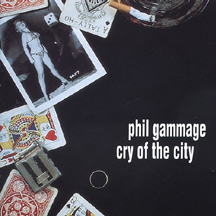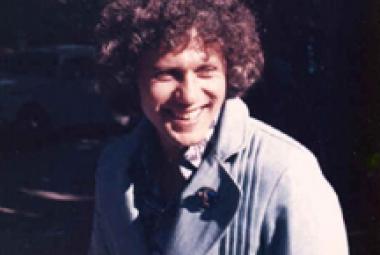One day, I put in Phil Gammage in Allmusic . . . and nothing came up. Still doesn’t. In some ways, it was less than nothing – there were 7 (yes, seven) albums listed by Phil Gammage, released between 1990 and 2014. But there was not a word of review about any of them, not a biography, not an Allmusic rating (number of stars). In fact, until I just put in a 4½-star rating of his album Cry of the City, there wasn’t even a “user rating” – many albums on Allmusic have hundreds or thousands of them, and I have posted several dozen myself.
I knew of Phil Gammage from a sort of CD EP that I got many years ago called The Electric Radio Sampler Music Test, I believe in a grab-bag package from Bomp! Records. Two of the songs from Cry of the City, “The Stranger” and “High Roller” were on that record that I immediately took to – slice-of-life stories that were well written and backed by a strong rock band. His vocals are a little idiosyncratic – he doesn’t have a trained voice and has some trouble with high notes, but he packs a lot of emotion into his music. It never occurred to me that Phil Gammage might be someone who had fallen so completely through the cracks.
* * *
Before long, I picked up a copy of the full Phil Gammage CD Cry of the City, and the whole album is equally good. The opening track, “Tough Town” sets the mood: the narrator has lost his job, found his woman in bed with another man, drinks all night, but: “Yeah, it’s a tough town, but I’m still around”. In “Castle Made of Sand”, he relates: “Yeah, ain’t it funny how things sometimes work out / One day you’re on easy street, the next you’re down and out”. Other songs follow the same theme: “I Took a Walk”, “Wait for the Dawn”, “Motel Called Loneliness”.
The closing song, “The Stranger” is maybe the best song of all on Cry of the City; this is the first time Phil Gammage openly sings from the standpoint of a traveling musician, and he seems out of step with everyone and everything around him (which is not exactly the stance of the earlier songs on the album). The subtext of the song might be his own experience of being an American who finds himself more popular in Europe:
Is there anybody here who speaks the language?
Is there anybody here who knows what I mean?
I am but a stranger here
And I have traveled long and far
with just the shirt on my back and my guitar
I’ve come to sing you songs of love
I’ve come to sing you songs of hate
But someone pass me the wine before it gets too late
Alright!
O.K.!
You don’t speak my tongue but I’ll sing anyway
“The Stranger” is preceded by a fine cover of a Robert Johnson song (always a good sign) called “Me and the Devil Blues”. It is played and sung pretty much like the rest of the songs – no need for Phil Gammage’s band to disturb their groove even for a classic blues cover. But each song has its own personality.
The best word to describe the album for me is genuine – so much so that it is not hard at all to imagine Phil Gammage himself being genuine as well. It might be because Phil appears to be singing about home, that is, his hometown of Houston, though it could just as easily be an amalgam of all of the cities where Phil has lived over the years. For instance, the crashing waves imagery in “Waves” doesn’t really fit Houston (although Galveston isn’t that far away), and the grit in so many of these songs seems all New York to me – but of course, I have personal experience in that city.
Phil Gammage clearly has made a lot of friends in what had already been a dozen years in music. Martin Blazy, who was a fellow bandmember in the Corvairs, serves as the drummer on Cry of the City; and the female vocalist, Wendy Wild had been an artist in the East Village scene when Certain General was starting up. Bassist D. Lee is from Band of Outsiders, and David Kaufman had been in the Nails / the Ravers.
Also, Peter Holsapple, who produced the first Certain General effort Holiday of Love, is a kindred soul – he is another Southern musician whose band, the dB’s had greater success in Europe than in the States.
* * *
As to the stance that Phil Gammage takes on Cry of the City, other rockers have taken this tack, but it usually doesn’t sound that bad. Bob Seger’s “Turn the Page” – a longtime favorite of mine, and if anything, Metallica’s 1998 cover of “Turn the Page” is even better than the 1973 original – explores themes of boredom and isolation, but not poverty and danger. This is not true of the music video that accompanied the Metallica song, however, which follows a single mother who works as an exotic dancer and a prostitute.
In Bruce Springsteen’s “Glory Days”, ballplayers and good lookers from schoolboy days are mentioned; in Phil Gammage’s “The Glory Years”, he is talking about happier times in an oil town that has gone bust. (To be sure,Springsteen has talked about hard times in many of his other songs).
In Phil Gammage’s songs, the imagery and the settings are strong enough that you are there with the singer, even when he is in the gutter. On the other hand, his songs are not gloomy at all; the music is upbeat for the most part, and there is a sense of triumphing over hardship, of being blessed with what you have.
The band backing Phil Gammage (on lead vocals, guitar and harmonica) on Cry of the City – Martin Blazy (drums, percussion, vocals), Dennis DeMeo (pedal steel guitar), Vincent DeNunzio (percussion, harmonica, vocals), David Kaufman (piano, organ), D. Lee (bass), Wendy Wild (vocals), and Victor Winograd (guitars) – has an easy, loping sound. The basic template I suppose is blues rock, but the steel guitar gives much of the album a country sheen; and it is nice to hear some great harmonica for a change (two harmonica players are listed in the credits, and how rare is that?), along with occasional bongo drums. The piano is particularly welcome in the mix, and all of the wonderful guitar of course.
At the beginning of the liner notes for the Phil Gammage CD Cry of the City is a free-verse poem that reads like verses and a chorus for a song; it must lay out the philosophy behind this album. (As it turns out, this poem forms the lyrics for a song called “Route 65” that is included on both Lowlife Street and Motel Songs). It ends:
My car’s standing still
And the world is whizzing by my window
That’s how I like it
Me and my dog
And this cracklin’ voice
Coming at me from my radio
He’s telling me who I am,
He’s telling me what I think,
Well let me tell you something pal
I ain’t no dead cat on Route 65
* * *
Phil Gammage left Certain General in 1985 and evidently returned to the Corvairs for a time; he then began pursuing a solo career. Prior to Cry of the City, he released two albums on a French label, New Rose Records, Night Train and Kneel to the Rising Sun. Last Call Records, yet another French label that issued his fourth solo album Lowlife Street (1999), says of this early trio of albums: “These records showcased Phil’s songwriting, guitar playing and vocals talents and found him exploring in depth blues and acoustic musical styles.” Of the new album, the promo material states: “This record takes up musically where his previous three solo records left off . . . original songs written by Gammage and performed in his unique and dynamic style.” A retrospective album, Motel Songs came out in 2003 featuring songs from Phil Gammage’s first four CD’s.
* * *
Since I only have Cry of the City thus far, I have Phil Gammage’s playlist on from his website, www.philgammage.com. Just one great song after another; they are mostly original songs, but one is a cover of “Baby, Let Me Follow You Down”, a traditional folk song that Bob Dylan included on his first album that I discussed earlier, Bob Dylan; another standout is an instrumental guitar-driven track called “Royal Flush”. (Two of Phil Gammage’s solo albums have been all instrumentals).
* * *
Here follows a reprint of the Trouser Press Record Guide (4th Edition) listing for the SourMash family of bands. Though slightly garbled, it presents a fairly accurate overview of our thing in the 1980’s.
Night Train (Fr. New Rose) 1990
Kneel to the Rising Sun (Fr. New Rose) 1991
20th Anniv. Reissue (2011)
Cry of the City (Marilyn) 1993
Lowlife Street (Fr. Last Call) 1999
Motel Songs (SourMash USA) 2002
(March 2015)















